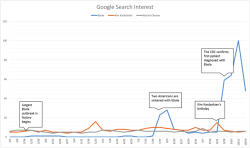 Ebola: a word tied with paranoia. If you were diagnosed with this deadly disease that has only a 50 percent survival rate, where would you turn to? Who wouldn’t turn you away? Doctors would not dare touch you unless completely masked behind personal protective equipment. Your family would want to be there for you, but they couldn’t without putting themselves at risk for contracting the virus. You’d be trapped in isolation. You’d live or die with as much certainty as a coin flip. Thousands of people face this exact situation, trying to maintain hope while knowing there is no cure.
Ebola: a word tied with paranoia. If you were diagnosed with this deadly disease that has only a 50 percent survival rate, where would you turn to? Who wouldn’t turn you away? Doctors would not dare touch you unless completely masked behind personal protective equipment. Your family would want to be there for you, but they couldn’t without putting themselves at risk for contracting the virus. You’d be trapped in isolation. You’d live or die with as much certainty as a coin flip. Thousands of people face this exact situation, trying to maintain hope while knowing there is no cure.
Interning at Direct Relief has opened my eyes to the virus’ destruction. With the organization sending medical equipment to disaster ridden areas, it I was in the forefront of the Ebola efforts since the beginning. It puzzles me, however, that only now have our phones been buzzing. Corporations are frantically contacting us for advice on preventative measures. People call worried that the virus will reach the United States. News centers, eager to collaborate with us, email us hoping to get a statement. Not to say that all the awareness is a bad thing, but did it take the spread of the Ebola outside of West Africa to spark this amount of attention for a disease that has killed about 5,000 people according to the CDC? Furthermore, people in the U.S. — who are at very low risk of contracting the virus — seem more concerned for their safety than that of people in West Africa.
Being a global studies major at the University of California, Santa Barbara, I am lectured every day by my professors on inequality in the world. I was shocked to experience this at Direct Relief when a gigantic surge of awareness coincided with cases of Ebola emerging outside of the West African region. It seems that only now has the global community reacted to the epidemic.
Interning at Direct Relief, I learned that this virus has been around for 40 years. For 40 years, people in African countries watched their loved ones die of this disease, paranoid that they would suffer the same fate. The U.S. is now experiencing this same paranoia. We’re realizing that the difference between ‘us’ and ‘them’ is actually a difference between ‘here’ and ‘there.’ The difference is that Ebola-hit countries in West Africa lack the same levels of economic stability and health infrastructure to provide care for people sick with Ebola. Aid is still needed where the epidemic started. There needs to be a greater response toward these needs.
Direct Relief has already sent 19 emergency airlifts of medical resources to more than 1000 local clinics across Liberia, Guinea and Sierra Leone. This includes a 747 charter with 100 tons of essential supplies — the largest single airlift to depart the U.S. for West Africa. Direct Relief is sending life-saving supplies not only for the victims of Ebola, but also for doctors and nurses working in the region.
The paranoia around Ebola is encouraged by doubt. There is reason to fear the virus, but even more reason for proactive steps to stop it at its source. Now, more than ever, we need to lend a hand to nations reeling to contain the virus. UCSB students have the opportunity to join the global community and help. A nonprofit organization is mobilizing a response less than ten minutes away. Direct Relief has been there for West Africa, and will continue to be there for anyone who wants to push for a solution. It took a case in the U.S. for us to become aware of this 40-year-old virus. It’s past time we do something about it.
Brian Carandang is an intern for the Communications Department at Direct Relief.
Views expressed on the Opinion page do not necessarily reflect those of the Daily Nexus or UCSB. Opinions are submitted primarily by students.















